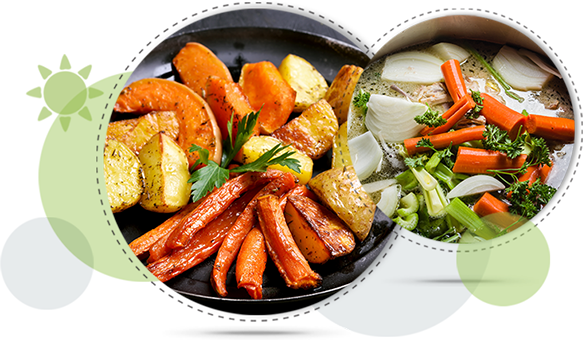
One of the best cooking methods to benefit in an adequate and balanced nutritional habit is eating boiled broccoli or cauliflower, or potato salad. However, one late study suggests that food fried in olive or sunflower oil might be healthier than boiled. This claim caused all of the suggestions made until then to be reviewed once again.
The study examined four separate vegetables cooked with sauteing in extra virgin olive oil, boiling and deep frying in extra virgin olive oil. The fat content of the food and the level of phenolic compounds that are considered to be preventive against cancer were observed in the study. It was found that the deep fried and sauteed vegetables were richer in fat and phenolic compound content. The boiled vegetables contained a lesser amount of fat and phenolic compounds.
In order to answer the question, "should we deep fry the food now," we need to review this study along with the researches made until now.
The study solely observes the fat and phenolic compounds in fried food. It does not evaluate the risk of cancer that might be developed or prevented with the consumption of these nutriments.
The other nutrients that from with boiling or frying are not observed in the study. The effects of cooking methods on loss of vitamins and minerals, or other health beneficial elements are not specified.
Concluding from the study that "deep frying food is good for health" may be an inaccurate suggestion. Because hyroxytyrosol, the phenolic compound found in the study is naturally present in olive oil. Therefore it can be considered as an obvious fact that it is not found in raw or boiled vegetables.
World Cancer Research Fund (WCRF) suggests consumption of a minimum of 5 portions of vegetables and fruits daily in order to lower the risk of cancer. They also support the minimum consumption of food with rich energy (calorie) content.
One gram of olive oil contains 9 calories. For this reason, very high consumption of olive oil is not suggested as a part of an adequate and balanced diet. It should also be considered that high fat consumption may increase the daily calorie intake and may cause obesity.
World Health Organization (WHO) suggests that the daily amount of energy from fat consumption should not exceed 30 percent of all energy intake. WHO states that this oil consumed from food should mostly be polyunsaturated fats such as fish oil or olive oil.
Although many studies show that the polyphenols are effective in decreasing the risk of certain diseases and prevention from cardiovascular diseases, the suggested daily amount of intake is not present in any of the dietary guidelines.
The booklet "12 Steps in Healthy Eating" published by the Turkish Ministry of Health, also suggest using cooking methods such as boiling, baking, steam cooking and microwave cooking.
References:
- Ramierez-Anaya, J. et al. Phenols and the antioxidant capacity of Mediterranean vegetables prepared with extra virgin olive oil using different domestic cooking techniques. Food Chemistry. 188: 430-438.
- http://www.wcrf.org/sites/default/files/Second-Expert-Report.pdf
- http://www.euro.who.int/en/health-topics/disease-prevention/nutrition/a-healthy-lifestyle
- T.C. Sağlık Bakanlığı http://beslenme.gov.tr/content/files/yayinlar/brosurler/dahaoncehazirlanmis_brosurler/01.pdf


